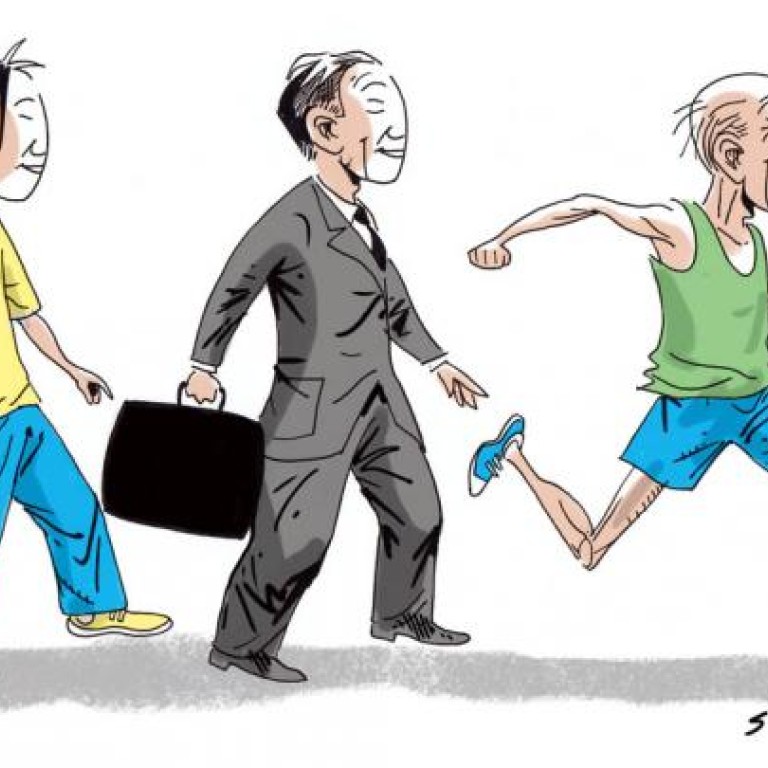
Hong Kong must act to reap longevity dividend
Paul Yip and Lucia Liu say the speed and scale of population ageing will most affect countries with sizeable numbers of people in need. Hong Kong must act to reap the longevity dividend
The 20th century was a time of population explosion. The number of people on this planet stood at 1.6 billion in 1900, rose to 3.3 billion by 1970 and reached more than 6 billion by 2000.
This century, by contrast, will be a time of population ageing. Last year, nearly 810 million people were aged 60 or over, accounting for 11.5 per cent of the global population. That number is expected to more than double, to 2 billion, or over a fifth of the global population, by 2050.
Population ageing is happening in all regions and in countries at various development levels. However, it is occurring fastest in developing countries, which are the least well prepared for the changes.
It took more than a century for France to double the number of its older adults, but it took only 20 years in mainland China and Hong Kong.
Take Hong Kong. Over the decade ending in 2011, the proportion of those aged 65 and over grew by only 2 percentage points, to 13 per cent, but this figure will shoot up to 19 per cent by 2021 and further - to 26 per cent - in 2031, according to the government's projection. Given the drastic speed and magnitude of population ageing, is Hong Kong ready for the change?
Hong Kong and the mainland face a different predicament from the developed countries with relatively affluent elderly populations; we are getting old before we get rich. There will be enormous difficulties in looking after those who are not well-prepared financially, or are not in good health.
During a workshop on ageing in Tokyo last month, we reviewed the practices and challenges facing other countries.
In 2011, 23 per cent of Japan's population was aged 65 or over, the highest percentage in the world. With very little immigration to rejuvenate the nation, Japan's total population has been falling since 2010.
The current total of 127 million is expected to drop to about 95 million by 2050, a 25 per cent reduction. With the rapid increase in the number of baby-boomer retirees, the strain on pension benefits and health and long-term care services has increased dramatically; rapid ageing may jeopardise the finances of the whole social support system. The Japanese government is pushing companies to raise the retirement age from 60 to 65 to reduce the burden on the public pension system while encouraging the elderly to participate in the workforce.
Other policies aimed at securing the financial well-being of the system include increasing pension premiums and the government budget for pensions, raising the eligible age for receiving pension benefits and the introduction of a mechanism to automatically adjust benefits according to changing prices and life expectancy.
Health care patients are required to pay a certain percentage (from 10 to 30 per cent) of their medical costs despite a universal health care scheme, in an effort to reduce the unnecessary use of services.
The others participating in the workshop - China, Thailand, Indonesia, Malaysia and South Korea - are all populous countries undergoing rapid demographic changes.
Population ageing presents social, economic and cultural challenges to individuals, families, societies and the global community.
It is how we address the challenge and maximise the opportunities of an ageing population that will determine whether society reaps the benefits of the longevity dividend.
For Hong Kong, time is running short to prepare for these changes. In the SAR, about 14 per cent of the population is currently aged 65 or over. Our dependency ratio is at an all-time low; however, it will increase quickly due to the retirement of baby boomers from the 1950s.
We have no time to waste to enhance our capacity to address the challenges associated with this demographic shift. And we cannot solely rely on government efforts to look after elderly in need.
Instead, private enterprises, the community and family must be mobilised. For example, the "money follows the patient" approach to care support should be further developed, promoted, monitored and evaluated for its effectiveness to develop a more flexible and creative model for the elderly.
We should explore ways of making use of resources in the local community and family members to meet some of the needs. Tax rebates for income-earning family members to look after the elderly is another way to deal with the increasing need.
Sixty years ago, life expectancy in China was only 45. Today, we regularly celebrate the birthdays of relatives and friends who have reached their 70s, 80s, 90s or even 100. Hong Kong should be proud of achieving one of highest life expectancies in the world - 86 for women and 81 for men - due in large part to improvements in health care, and clean water and nutrition.
Yet, many challenges remain. Keeping the population healthy can reduce health care costs, while maintaining a good quality of life.
Officials should be promoting the benefits of a healthy lifestyle from an early age; once we reach old age, change becomes that much harder.
To meet the challenges of ageing, Hong Kong needs to invest in its young people. Ensuring they remain healthy and productive throughout their lives will be a vital step in ensuring Hong Kong's population remains sustainable and dynamic.

